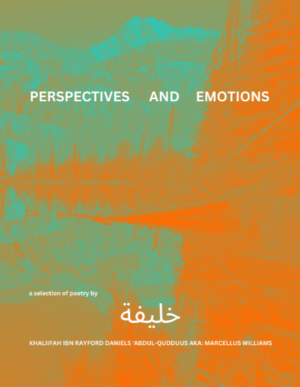On Poetry
On Marcellus Khaliifah Williams’ “At Last...Another’s Heartbeat”
At last…Another’s heartbeat
the silhouettes of their bond visible still at the last glow of the sun
they experience each other and the life of the night as it begins to stir
standing there in silence holding hands
no rush to go back inside
there is so much beauty and comfort in being in love and just being...
- amidst sounds of buzzing
chirps
crickets
the pleasant but irregular blowing of the wind
fireflies dancing in step with the light of the moon
how strange it is to become aware of another's heartbeat but forget one's own-
finally love.
Khaliifah requests that his writings remain in the public domain, forever free.
On Marcellus Khaliifah Williams’ “At Last...Another's Heartbeat”
I am stuck on the pause before “Another’s heartbeat” that begins the poem, that now, outside the poem, with respect to Marcellus Khaliifah Williams, is a long eternal night. And, here, I would love nothing more than to throw an endless mourning shroud over you and I and everyone grieving, to bring us together into the warmth of another’s embrace, to weep at a loss before we knew what we had. Here, I don’t mean loss as in a passive language evasion of state murder. I mean loss as in, in his life, Williams offered us poems. We have lost a poet. So many of us have lost the chance to find him while he was alive. How many poets do we not know? This loss multiplies.
As a poem, I first consider the shape, the drama that attends the irregular long and short lines, the latter of which congregate near the center of the poem. Accentuated by the absence of punctuation and capitalization, the long lines that begin the poem extend and enact. They render and tell us of the potential endlessness of a moment; they are the seeming experience of moments. While the clipped, shortest lines, “chirps / crickets,” are external, of the natural world, made by other beings, almost clicking into place the swift evaporation of these moments.
We return to experience again with “the pleasant but irregular blowing of the wind.” Having dispelled with the “they” of the second line, collapsing the distance created by “the silhouettes” of the first, experience becomes mine, the reader. How much in my life I have enjoyed (and taken for granted) the pleasant irregularity of wind and the natural world. “Fireflies” and “the moon,” there are things the poem’s speaker is aware of, that come into view through practicing a kind of observation, a slowing down.
The line keeps getting longer at the end of the poem, when the awareness shifts to not just another thing but a person, “how strange,” and in so doing, in considering the other person, in taking that personhood so seriously as to perceive his heartbeat, “forget one’s own.” That is the thrilling danger of being with another person. Not romantically or platonically, but even momentarily. To be with someone truly, to dissolve the self in the presence of an other, to commit to extending that moment, that is the most radical act.
If we are talking about love and it’s public expression, justice, we must consider sentences. A sentence (in every sense of the word) is, perhaps more than anything, a question concerning endings. Writing from within a sentenced life, Williams’ poem, which is only one sentence, begins at the end. The title begins “At last,” and the first line brims with terminations and its remnants: “the silhouettes of their bond visible still at the last glow of the sun.” But before we consider the dusk, bonds, and shadows, a moment to praise the line’s lush sound: ululation and sibilance, the l’s and the s’s, the lilting and the succor. I have slipped, like a shadow, with my lover into something elemental. Or possibly, simply: Marcellus Williams. The sound still laying there. Back, then, to dusk, bonds, and shadows. No. No. You know how those metaphors end. You know how all this ends. Stay with me:
There are five punctuations in the poem—two ellipses, two n-dashes, and the final period. And whereas punctuation often indicates an ending, even if momentarily, of an idea, a clause, a particular set of privileged information, this poem’s punctuations do the opposite. The ellipses and n-dashes in particular are each a stay, a pause, a breath, a moment before the heart beats. There is silence in each mark, both lingering and pushing us forward, the loudest of which comes in the jump between lines five and six. When the punctuation combination “… / -” leaps, it follows a line that begins and ends with “being,” with “love” and “just” found somewhere along the way—of course, here, “just” as in merely and not the other because when a nation is also a murder machine, it has no need for love. No, not yet.
I long to live forever in the world of Marcellus Williams’ poem. “no rush to go back inside / there is so much beauty…” When it comes to endings, I don’t know how to do that here. You know my thoughts on that final period. The state should never kill people. No one should be executed.


